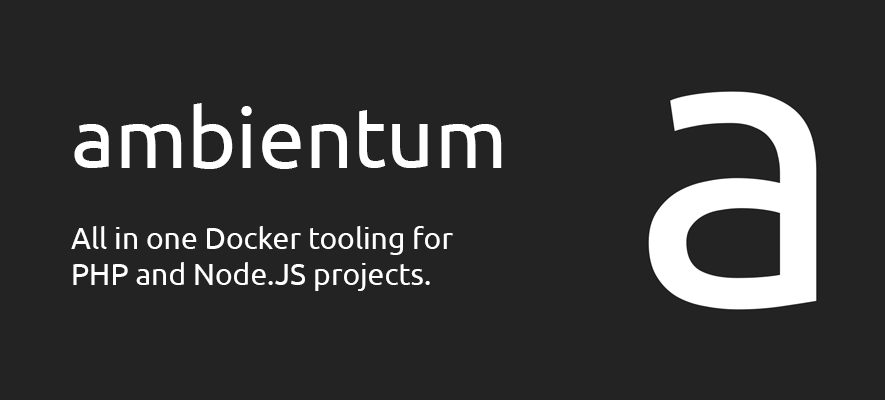Keeping it uniform between development, staging and production environments is often something not easy. On the last years, our buddy Docker has become more and more mature and now it's becoming the standard.
We all love Laravel and Vue.JS, but why develop a Rock Star code with a Kick-Ass framework without an awesome environment?
No more "it worked on my machine"!
Ambientum can help you doing some amazing things, the 3 main scenarios are listed above:
- Run Laravel and/or Vue.JS in Development.
- Run Laravel and/or Vue.JS in Production (Continuous Integration included).
- Replace local dependencies with Docker commands.
Before staging with Ambientum, a few pieces of knowledge must be in place:
- The basics of Docker and Containers.
- Being comfortable around the command line.
- Know how to operate
docker-compose.
Docker compose shipped with Docker is usually very old. Please have the latest version installed from Github at https://github.com/docker/compose/releases.
If you are already comfortable with the tools and have played around Ambientum, here are the set of images available for usage, so you can start building your environment with the tools that you may want.
PHP 7.2 is available but yet without xDebug support, considering this, it will not receive the latest tag until xDebug stable is compatible with PHP 7.2
| Repository | Images/Tags | Description |
|---|---|---|
| ambientum/php | 7.2, latest |
PHP v7.2 for command line and queues |
7.2-nginx, latest-nginx |
PHP v7.2 with Nginx webserver | |
7.1 |
PHP v7.1 for command line and queues | |
7.1-nginx, latest-nginx |
PHP v7.1 with Nginx webserver | |
| ambientum/node | 9, latest, current |
Node.js v9.x |
8, lts |
Node.js v8.x |
One of the features of ambientum is allowing you to replace commands (normally painful to install) with their docker based version.
There are a set of aliases that helps you with that task, and before proceeding you will need to install and activate those aliases:
curl -L https://github.com/codecasts/ambientum/raw/master/commands.bash -o ~/.ambientum_rc
source ~/.ambientum_rc
curl -L https://github.com/codecasts/ambientum/raw/master/commands.fish -o ~/.ambientum_rc
source ~/.ambientum_rc
For others Windows consoles (like PowerShell or Cmder), check this link.
curl https://github.com/codecasts/ambientum/raw/master/commands.git-bash -o ~/.ambientum_rc
source ~/.ambientum_rc
Once you have those commands activated, following the instructions above, you can start using them right away.
Everything Node.JS related can be executed by prefixing the n command. For example, let's say we need to install Gulp
n npm install -g gulp
n gulp --version
Everything PHP related can be executed by prefixing the p command. For example, lets say we want to run composer:
p composer global require some/package-here
Or even run php against a single file:
p php test.php
Another example would be starting a new Laravel project:
p composer create laravel/laravel my-project-name-here
Well, that's the whole point of the project, the commands there was designed for quick usage of stand alone commands, so we have a great alternative when we have a project already, we can define a docker-compose.yml file that will expose and run the services we need.
Understanding the docker-compose compose tool is appreciated in order to use the following configuration files.
####
# ATENTION:
# Replace all occurences of sandbox with your project's name
####
# v2 syntax
version: '2'
# Named volumes
volumes:
# Postgres Data
sandbox-postgres-data:
driver: local
# MySQL Data
sandbox-mysql-data:
driver: local
# Redis Data
sandbox-redis-data:
driver: local
services:
# Postgres (10.3)
postgres:
image: postgres:10.3
container_name: sandbox-postgres
volumes:
- sandbox-postgres-data:/var/lib/postgresql/data
ports:
- "5432:5432"
environment:
- POSTGRES_PASSWORD=sandbox
- POSTGRES_DB=sandbox
- POSTGRES_USER=sandbox
# MySQL (5.7)
mysql:
image: mysql:5.7
container_name: sandbox-mysql
volumes:
- sandbox-mysql-data:/var/lib/mysql
ports:
- "3306:3306"
environment:
- MYSQL_ROOT_PASSWORD=sandbox
- MYSQL_DATABASE=sandbox
- MYSQL_USER=sandbox
- MYSQL_PASSWORD=sandbox
# Redis
cache:
image: redis:4.0
container_name: sandbox-redis
command: --appendonly yes
volumes:
- sandbox-redis-data:/data
ports:
- "6379:6379"
# PHP (with Nginx)
# you can change from nginx to apache, just change session 'image'
app:
image: ambientum/php:7.2-nginx
container_name: sandbox-app
volumes:
- .:/var/www/app
ports:
- "80:8080"
links:
- postgres
- mysql
- cache
# Laravel Queues
queue:
image: ambientum/php:7.2
container_name: sandbox-queue
command: php artisan queue:listen
volumes:
- .:/var/www/app
links:
- mysql
- cacheDeveloping with Vue.js? We got you covered! Here is the docker-compose file:
version: '2'
services:
# Web server - For live reload and development
# This environment can be used to run npm and node
# commands as well
dev:
image: ambientum/node:9
container_name: sandbox-vue-dev
command: npm run dev
volumes:
- .:/var/www/app
ports:
- 8080:8080
# Testing dist on a "real" webserver
production-server:
image: nginx:stable-alpine
container_name: sandbox-preview-server
volumes:
- ./dist:/usr/share/nginx/html
ports:
- 9090:80